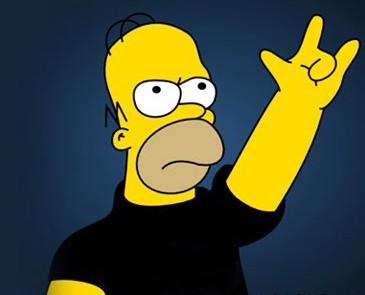Homer’s devotion to Grand Funk Railroad is so unyielding that when The Who came to town five seasons later (in the episode “A Tale of Two Springfields”), he handed frontman Roger Daltrey a list of Grand Funk songs to play. What is it about Grand Funk that strikes such a powerful chord with this dimwitted, doughy everyman? Here are three possibilities.
1. Grand Funk Railroad is the quintessential blue-collar band.
Grand Funk never set out to revolutionize rock’n’roll: critics were openly hostile to the group’s Cream-influenced, meat-and-potatoes riffage, but working-class fans adored these Flint, Mich. natives despite (or maybe because of) their indifference to innovation.
“People loved this band because some record company didn’t concoct it. Image consultants didn’t choreograph it,” proclaimed avowed Grand Funk fan Michael Moore, the Flint-born documentarian and activist behind films including Roger and Me and Bowling for Columbine. “This was a people’s band that just wanted to rock. A hard-driving, industrial rock’n’roll band that related to the average hard-working American.” (Admittedly, Homer’s not much of a hard worker — he once gained 61 pounds to claim a disability and work at home — but Moore’s point still stands.)
2. Grand Funk isn’t exactly deep.
Let’s be frank: Grand Funk’s music is big, loud and unapologetically primal, with the style and sophistication of a club-wielding caveman bludgeoning a sabertooth tiger. Here’s Brewer explaining the genesis of the group’s first number one hit, the 1973 classic “We’re an American Band.”
“Our manager kept saying ‘Why don’t you just write songs about what you do? Look, you’re out here on the road, you’re going to this hotel, you’re going to the place, there’s people, you’re coming into town,’” Brewer told Songfacts. “So the thought came to my mind: ‘We’re coming to your town, we’ll help you party it down.’ That’s really what we were doing — we were coming into towns and we were the party. So that’s where the line came from. And the next thought that I had was, ‘We’re an American band.’ And it wasn’t, like, to wave the flag or anything. It was just simply that’s what we were.” For Homer Simpson — a man with an IQ of just 55, thanks to the blue crayon lodged in his brain since childhood — this is no doubt the stuff of pure poetry.
3. Grand Funk indisputably kicks ass.
“We’re an American Band” erupts from your speakers: Todd Rundgren’s AM radio-optimized production reins in the group’s blooze-rock excesses, but the sound is still massive, galvanized by Farner’s supernova guitar, Schacher’s Richter-scale bass and Brewer’s much-more-than-competent drumming (dig that cowbell). To the uninitiated, the single could easily pass for something from the Tenacious D catalog: its macho bombast and locker-room sensibilities teeter on the brink of parody. But if complexity and subtlety are what you want, go listen to Steely Dan. “We’re an American Band” is everything rock’n’roll should be — no more, and no less. “Maybe if you’re truly cool, you don’t need to be told you’re cool,” Homer suggests at the conclusion of “Homerpalooza,” and a more succinct summary of Grand Funk Railroad you will not encounter.
You can experience “We’re an American Band” here on KORD.






